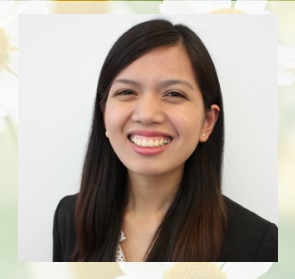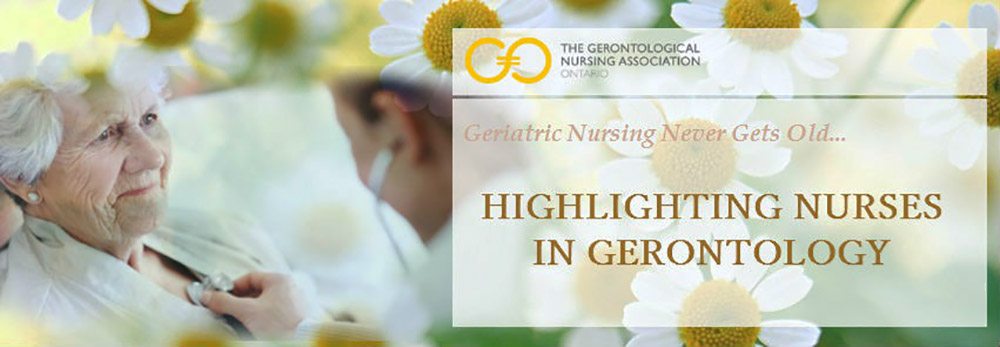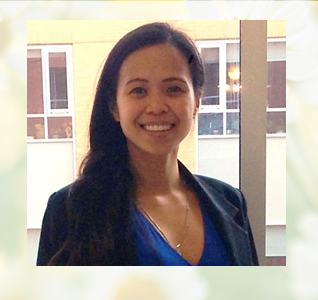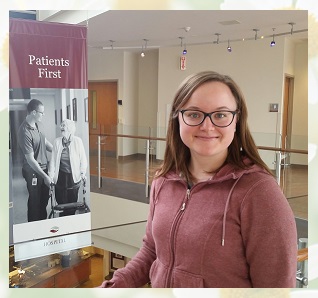Highlighting GNAO Nurses
November brings us one more story for the year 2016 in our segment:
Geriatric Nursing Never Gets Old… Highlighting Nurses in Gerontology!
In case you forgot, this segment highlights nurses working in the field of gerontology and introduces you to their world! We invite you to read up on our nurses and to engage in discussion with them via the Student Discussion Forum, Social Media (facebook or twitter) or directly through the contact information that they provide.
For the month of November 2016, we are shaking things up and highlighting a student who has great passion for gerontological nursing. Patricia Julian is currently a fourth year nursing student at Ryerson University. She is also our Student/New Graduate Liaison.

Patricia Julian
Please describe to us your current role and what it is that you do in gerontology.
I am a current fourth year student at Ryerson University. I am completing my pre-consolidation and consolidation placements at St. Michael’s Hospital Heart and Vascular Program. Majority of the patients I care for at placement are older adults and to provide the best care for my patients, I often consider age-related changes when I assess and deliver nursing interventions at the floor. For example, we regularly complete the confusion assessment method for all patients over 65 so we can detect any cases of delirium early on!
I also work as a research assistant for Lori Schindel Martin, an Associate Professor at the Daphne Cockwell School of Nursing at Ryerson University. We are currently completing a project aiming to explore emergency department staff’s learning needs with regards to caring for patients exhibiting responsive behaviours. We hope that the project can lead to a educational program on person-centred dementia care tailored for the emergency department.
Why did you decide to pursue gerontological nursing?
I volunteered at a long-term care home five years ago. My observations of the nursing staff and the residents left me with a deep impression. I falsely believed that seniors living with dementia and multiple comorbidities experienced poor quality of life. Yet my conversations with the resident changed my mind. I was impressed by the optimism and wisdom many residents held about life. I also admired the excellent nursing care the staff provided and the therapeutic relationships they formed with the residents. It was clear that the care staff provided enabled the residents to maintain their health or delay any complications from their disease. Desiring to give back to the previous generation and looking for fulfilling career with a positive impact, I decided to pursue nursing with the aim of working with older adults.
Many of us have been mentored or inspired by another nurse at some point in our nursing journey. Is there one person in particular who has helped you along the way in becoming a gerontological nurse?
Lori Schindel Martin, who I mentioned earlier, has made a positive impact on my education and clinical practice. Lori has encouraged me to enrich my gerontology knowledge and has given me many learning opportunities to do so. She has also kindled my interest in research, which I hope to pursue one day to make an impact on gerontological nursing care. I am thankful for the learning opportunities Lori has provided and I am not sure if I would have gained so much experience in gerontological research without her help!
What is one of the most fulfilling aspects of being a gerontological nurse?
The most fulfilling aspect of caring for an older adult is knowing that I am caring for someone with rich life experiences. I am caring for a person, who has lived a life, has seen a lot and has stories to tell.
What is one thing you would want to share about gerontological nursing that most people might not otherwise know?
Any nursing specialty (except maternity, pediatrics, neonatal ICU) is part of gerontological nursing! There is a common misperception that gerontological nurses only work in long-term care. I disagree. With the aging population and increasing incidences of disease as people age, a substantial number of patients that nurses will encounter would be older adults. Thus, it is imperative for all nurses to learn about gerontological nursing
Do you have any advice for nurses or students interested in pursuing gerontology as a specialty?
My suggestion is to becoming involved in professional gerontological nursing or interprofessional organizations (e.g., Gerontological Nursing Association of Ontario, Canadian Association of Gerontology). Becoming involved will allow you to network with like-mined professionals and learn about the current trends in the care of older adults. I also suggest pursuing opportunities to be a research assistant in a gerontological nursing or geriatrics-related project. This experience will help you become knowledgeable in best practices in gerontological nursing care.
If anyone is interested in connecting with you further, how can they reach you?
If you have any questions about joining GNAO or getting involved, you can email Patricia Julian.
If you are a nurse who is working in gerontology and would like to share your story on our page, email Annie

We are back this month with our segment:
Geriatric Nursing Never Gets Old… Highlighting Nurses in Gerontology!
This new segment highlights nurses working in the field of gerontology and introduces you to their world! We invite you to read up on our nurses and to engage in discussion with them via the Student Discussion Forum, Social Media (facebook or twitter) or directly through the contact information that they provide.
This month, we are happy to highlight and celebrate Jennifer Reguindin.
Jennifer is an interprofessional educator for the Baycrest Centre for Learning, Research and Innovation in Long-Term Care and is certified in healthcare simulation and gerontological nursing. Previously, she was also an advanced practice leader/nurse, and served as a subject matter expert for the Ministry of Health and Long-Term Care’s Long-Term Care Home Common Assessment Project.
An experienced staff nurse in the areas of intensive care, cardiac, and medical-surgical, her roles included nursing management and education for various Community Care Access Centres and Primary Health Care projects provincially. Jennifer received her Bachelor of Science in Nursing from Ryerson University in 2002. While completing her Master of Science in Nursing degree from York University, she also served as one of their clinical course directors.

Jennifer Reguindin
Please describe to us your current role and what it is that you do in gerontology.
I’m an interprofessional educator at Baycrest. I’m part of a Ministry of Health and Long-Term Care (MOHLTC) funded provincial project, Centre for Learning Research and Innovation in Long-Term Care (CLRI). I create education sessions, apps, books, resources that support the frail elderly, for example, emergency prevention and coordinating care in responsive behaviours. I’m also able to create and trial new activities using simulation and gaming to engage the registered and unregulated healthcare workers and students I work with in Ontario long-term care homes. Evaluation of all these resources and activities is a big part of what I do as well and ensuring that feedback that I received is incorporated to make things better for the learners and for the clients in long-term care (LTC). As you can see I work not just with nurses but also with allied health, personal support workers, and the students of these respective groups to support the population of this sector.
I’m also a coronary intensive care nurse and I do work with a lot of seniors who require critical care support for their cardiac issues.
Why did you decide to pursue gerontological nursing?
In adult healthcare, it is difficult to get away from gerontological nursing. I have experience in community, mental health, acute care, complex continuing care, and long term care. I have taught provincially and have had an international audience as well. Gerontological nursing knowledge and skill is very much needed in all these sectors. In Canada and around the world, the baby boomers are aging. They have been integral in changing policies over the last several decades and they continue to redefine what is necessary. My career wasn’t a pursuit of gerontological nursing as it is an increased awareness of reality and where I needed to be to grow as a professional. I wanted to do more and this is where I need to be.
As soon as I had this realization that there was this movement towards change in this sector, I knew I had to be a part of it. The best part of being an educator in this specialty is that I get to see an increase in quality of life of clients in LTC. Imagine seeing an increase in engagement of a client with dementia who has not spoken or does not usually open their eyes because I had the opportunity to teach the techniques to staff and students. Imagine increasing the confidence of nurses and PSWs to take leadership when a client is getting sick and preventing transfers to emergency, which is probably one of the worst things we can do for our frail elderly. It’s rewarding but there’s still a lot of work to do to ensure equity in this sector.
Many of us have been mentored or inspired by another nurse at some point in our nursing journey. Is there one person in particular who has helped you along the way in becoming a gerontological nurse?
As a profession, nurses are inspirational. I’ve had the opportunity to see them in many sectors and their knowledge, compassion, and leadership in service of others is amazing. The work of Rosemarie Rizzo Parse and the language that she has brought in to the nursing profession has specifically changed my cognitive framework as a nurse. Through her work, I was able to apply, integrate, and synthesize nursing care very differently than when I started out as a nurse. Her humanbecoming theory changed the way I practice, my professional outlook, and the way I teach. This theory reinforces that what I do affects others as a nurse, as a person in respect to my environment. It highlights choice, growth, dichotomies, and unknowns that really speaks to nursing in gerontology and even as a whole.
The language of the humanbecoming theory helped me grasp that being truly present with another (a client, a student, another nurse) allows for creation, changes in perspectives, and growth.
What is one of the most fulfilling aspects of being a gerontological nurse?
In my role, I have the chance to work with many long-term care (LTC) nurses and students. It has a macro impact. With the modules I’ve created and worked that speaks to atypical presentation of the frail elderly & working with responsive behaviours in dementia, I am able to contribute towards outcomes in LTC homes. I utilize an interprofessional education and collaboration framework in all my work to enhance the work of a team and hopefully be a more cohesive unit. I’m able to increase situational awareness and management into this sector. When this is combined with the therapeutic relationship that is unique in a LTC setting, it helps prevent emergency transfers in LTC homes in Ontario. It’s humbling and drives me to be better professionally.
What is one thing you would want to share about gerontological nursing that most people might not otherwise know?
It is complex and working in this field makes you reflective. The landscape is ever-changing and because of this professional growth constant. I work with a lot with the frail elderly. If they do get sick their presentation is atypical in that our textbook knowledge may not be applicable. This may lead to a lot of concerns if a healthcare practitioner is not aware.
Do you have any advice for nurses or students interested in pursuing gerontology as a specialty?
The pursuit of knowledge and the desire to continuously be better as a professional should drive you forward – not just textbook knowledge, but also the client’s story. Constantly remembering that there is a person behind every client is necessary in this line of work. The level of accountability, critical thinking, communication skill, and compassion needed in this specialty is like no other because of the frailty, comorbidities, and complexity of the very sick elderly and their families.
In this profession, self-care is very important.
If anyone is interested in connecting with you further, how can they reach you?
Visit me at Baycrest! Or email me.
If you are a nurse who is working in gerontology and would like to share your story on our page, email Annie
![]()

The Gerontological Nursing Association Ontario is pleased to present our new segment titled…
Geriatric Nursing Never Gets Old… Highlighting Nurses in Gerontology!
Gerontological nursing is a unique and diverse field of nursing that focuses on the care of older adults. Many geriatric nurses provide care to these older people in various different settings. Although we all have specialized knowledge and training to effectively educate, assess, and care for this population, the way in which we go about it is slightly different and unique. This new segment highlights nurses working in the field of gerontology and introduces you to their world! We invite you to read up on our nurses and to engage in discussion with them via the Student Discussion Forum, Social Media (facebook or twitter) or directly through the contact information that they provide. As we move into the month of March, please join us in highlighting and celebrating Sarah Gibbens!

Sarah Gibbens
Please describe to us your current role and what it is that you do in gerontology.
I currently work as a Geriatric Emergency Management Nurse (GEM RN) at Northumberland Hills Hospital in Cobourg. I provide clinical, gerontological, consultation in the Emergency Department (ED) as the primary component of my role, but concurrently work on several organizational projects as they fit with bettering the care of older adults and also on several community committees that focus on the needs of seniors. The clinical role consists of targeted gerontological assessments in order to quickly decipher what’s new and what’s not, with a strong focus on the identification of geriatric syndromes. Some examples of geriatric syndromes are delirium, depression, falls/mobility issues, caregiver stress, cognitive impairment, pain, and polypharmacy. Assessments include, but are not limited to: deciphering if delirium is present or not; investigating cause(s) of falls; looking at mobility and activities of daily living; and screening for medications deemed high risk. It very quickly provides a good picture of new versus chronic conditions. From this, the GEM can link seniors with community resources and support, or advocate for a hospital admission. I also work with seniors’ right in the ED in order to prevent any cognitive and functional decline from occurring in such a high speed, chaotic environment. This includes getting older adults up and walking – it is the number one way to prevent hospital admissions and decline in my books! Other initiatives are essential like: getting an older adult with dementia engaged in activities like music therapy right in the ED; calling in the support of family to bring in dentures, hearing aids, and glasses of the vision and hearing impaired; and encouraging food and fluid intake while waiting many hours for tests and results.
Why did you decide to pursue gerontological nursing?
I worked as a dietary aide at a retirement facility for a summer job during university, and quickly saw how such small interventions can make such amazingly positive impacts in people’s lives. Not knowing at the time, but I worked with one man in particular who had dementia and was non-verbal. He would only point or grunt until we could all understand his routine. One day I began to sing while cleaning up the dining room and his voice boomed out as he finished the chorus of Somewhere over the Rainbow. I will never forget the person I saw behind the dementia, the sound of his voice, and the smile on his face. I wanted to continue to pursue this passion with more depth in the nursing field. Once in the field I saw just how much specialty is required for gerontological nursing, and wanted to become as strong an advocate as I could so I completed a Master of Nursing from the University of Toronto. I strongly pursued the GEM RN role as it seemed to fit all my interests and offered me an opportunity to continue to grow throughout my career.
Many of us have been mentored or inspired by another nurse at some point in our nursing journey. Is there one person in particular who has helped you along the way in becoming a gerontological nurse?
There is a very special mentor in my life and has made a significant difference in my clinical practice and in my confidence in myself as an advocate for this vulnerable population. I met Maryanne Brown almost 4 years ago and have since made leaps and bounds as a gerontological nurse. Maryanne pushed me to take on challenging opportunities and supported me during some of the most difficult years as a new GEM RN. Maryanne Brown is an Advanced Practice Nurse Consultant who I am so lucky to have met and without her, I am uncertain where I would be in my career. I encourage anyone to reach out and develop mentorship relationships if possible. They are invaluable and, at times, career saving! I want to take this opportunity to thank Maryanne from the bottom of my heart for her guidance and support, and tell her that I will find success if I am able to mentor someone else in the future with even half the wisdom that she provided me.
What is one of the most fulfilling aspects of being a gerontological nurse?
The most fulfilling aspect of gerontology is that every single day, when I look into the eyes of an older adult, I am trusted to hear their life stories, their memories, their worries and fears, their secrets, and their hopes and dreams.
What is one thing you would want to share about gerontological nursing that most people might not otherwise know?
There is a massive community of nurses interested and passionate about gerontology out there! You are not alone!
Do you have any advice for nurses or students interested in pursuing gerontology as a specialty?
Never give up. You will hear things from others like, “you need to build your skills first on the medicine floors” or, “you don’t want to lose your skills”, and I have even heard, “so you don’t want to do real nursing?” Never give up — the older adults require your advocacy, your passion for change, and your expertise. Reach out to a mentor for support, and keep your head high during those times when others challenge you with comments rooted in stereotype.
If anyone is interested in connecting with you further, how can they reach you?
Please feel free to do so via email – I look forward to any connections that can be made!
If you are a nurse who is working in gerontology and would like to share your story on our page, email Annie
GNAO Newsletter
Find the link to the newsletter on the Resources page
More Nurse Highlights:
Highlighting Patricia Julian
Highlighting Jennefer Reguindin
Highlighting Sarah Gibbens